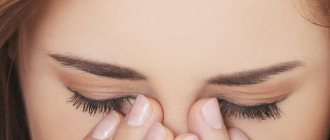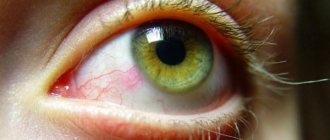Headaches can often be accompanied by a feeling of pressure on the eyes.
Such manifestations occur in healthy people and may be signs of the development of pathological processes. When the frontal part of the head hurts, it may be accompanied by pressure on the eyes.
Pain caused by tension
One of the reasons why pain in the eye area and in the head in general may occur is simple fatigue.
Fatigue and excessive eye strain due to working at the computer or with documents can cause headaches in a person. In particularly advanced cases, general weakness, dizziness, and nausea occur. At the same time, the eyes become red, because when working at a computer a person blinks less often, which affects the condition of the mucous membrane.
To avoid such problems, it is necessary to perform so-called “office” gymnastics for the eyes, regularly arrange days without a computer, observe a work-rest schedule, and use artificial tears.
Incorrectly chosen glasses can also cause headaches. If a person needs to wear glasses, but he does not, or the glasses do not fit him, the optic nerve is constantly very tense, which affects the occurrence of pain.
Sometimes, if there is a strong discrepancy between the vision and the glasses chosen, a person becomes dizzy, feels nauseous, and his eyes become red and watery. The only solution is to visit an ophthalmologist who will help you choose the right glasses.
Feeling of pressure on the eyes: why does it press and what to do?
26.10.2018
Sometimes a person feels pressure on the eyes from the inside. Most often this is due to high loads on the visual apparatus. But sometimes a feeling of pressure is a sign of illness.
Causes
Pressure on the eyes can be caused by a variety of reasons. The most common is eye fatigue. Eye fatigue occurs from prolonged use of a computer or gadgets, reading in low light, or straining the eyes with small objects.
Migraine and cluster pain
Another reason for severe headaches may be migraine. The sensations that arise during a migraine are often described as unbearable, and the pain in this case is special: localized on one side, radiating to the temples, eye area or back of the head. As for the eyes, the right or left eye may hurt separately, visual disturbances, distortions, etc. appear. There is excessive sensitivity to bright light, noise, strong odors, dizziness, nausea, and vomiting.
This condition can last up to 72 hours, then goes away on its own.
Scientists have still not precisely established the causes of migraine, and treatment boils down to identifying and eliminating provoking factors, as well as taking potent medications.
Cluster pain is sometimes confused with migraine, but these conditions are still different. With cluster pain, the sensations are localized in the forehead and eyes, but their exact cause has also not been identified.
Painful sensations may vary in duration, frequency, intensity and severity. Other signs appear: watery eyes, red eyes. Unfortunately, painkillers often fail to eliminate symptoms.
If you have a headache and pressure on your eyes: WHAT to do
Any headache causes severe discomfort. If you have a headache and put pressure on your eyes, this may indicate either overwork or a very serious illness.
Obviously, a headache that radiates to the eyes is a very common symptom, which is why most people are familiar with it firsthand. Despite its commonality, neglecting the condition is unacceptable.
Perhaps the cause of the malaise is harmless, but it may also indicate serious disorders.
If there are no reasons for the pain in the form of stress and lack of sleep, and it does not go away on its own, you should immediately consult a specialist, forgetting about self-diagnosis and self-medication.
Causes of headaches with eye pressure
The symptom of a headache that radiates into the eyes is very common and can indicate a number of problems. The most common reasons:
- Fatigue, eye strain. This is typical for people whose occupation involves constantly sitting at a computer, after watching TV for a long time, or reading books from electronic “readers”.
- Lack of sleep. Glasses or contact lenses that were not fitted correctly. The symptom gets worse throughout the day. Diopters that are not suitable for specific eyes have a negative impact on the optic nerve.
Subscribe to our INSTAGRAM account!
- If discomfort occurs when sneezing and coughing, this indicates high blood pressure.
- Nervous overstrain. “Floaters” may appear before the eyes. Combined with pressing pain in the eyes, this occurs due to spasms of the blood vessels supplying the face and neck.
- After bruises and blows to the head, a migraine with pressure in the eyes in this case may indicate a concussion.
- Glaucoma, migraine and other diseases.
- Constant jerking pain occurs in dangerous conditions: meningitis, sarcoma, encephalitis, aneurysm.
- Allergic reaction.
The list of causes of the symptom is very large, so it is important to consult a doctor and not self-medicate, especially if the phenomenon does not go away for a long time.
Forehead hurts and puts pressure on eyes
Most often, pain in the head in the forehead area radiates to the eyes. They may indicate unexpected problems in the body.
Poisoning
For your information! Toxins in industrial products may cause this symptom. Often found among sellers and warehouse workers.
To avoid permanent poisoning, it is advisable to avoid furniture or household appliances with a strong chemical odor. If you experience any discomfort, pay attention to your recent purchases - they may have caused your discomfort.
A similar reason is a reaction to components of food additives: nitrates, monosodium glutamate, etc.
The symptom also occurs with an allergy to citrus fruits.
ENT diseases
Possible diseases that are characterized by this symptom:
- Sinusitis. The disease is accompanied by headache and eye pain, runny nose, and fever. The sensations can be very strong, and the condition is regarded as dangerous due to the proximity of the inflammatory process to the brain.
- Inflammation of the mucous membranes of the frontal sinuses - Frontitis . Characterized by pain after waking up.
- Inflammation of the ethmoid sinus in the skull - Ethmoiditis . Occurs in children, as well as adults with weak immunity.
Eye diseases
The described symptom can be accompanied by all common eye diseases: astigmatism, conjunctivitis, myopia, etc.
Remember! If you notice such defects, as well as with constant migraines due to overexertion at the computer, you should contact an ophthalmologist.
Subscribe to our Yandex Zen channel!
Nervous system diseases
The forehead hurts and puts pressure on the eyes when there are disorders:
- Migraine. A very common problem with sharp throbbing pain in different parts of the head, including the forehead.
- Neurosis. Typical for easily excitable people, other symptoms may be absent. It is quite difficult to determine neurosis; most often it is diagnosed by excluding other possible causes.
- Cluster pain . They are characterized by the presence of redness and watery eyes, very sharp, unbearable pain. At risk are people who have recently abruptly changed their climate zone, abuse alcohol, and smoke.
Sinusitis pain
Another reason why pain appears in the eye area can be sinusitis (most often frontal sinusitis or sinusitis). When the disease worsens, pain is observed from the affected sinus (the right or left eye suffers, respectively), nasal congestion, high fever, and swelling of the face.
It must be borne in mind that elevated body temperature is always a sign of internal inflammation, and therefore cannot be ignored.
Competent and timely treatment will protect a person from developing complications, so if such symptoms occur, you should visit an otolaryngologist.
Liquorodynamic disorders
In some cases, headaches are caused by poor circulation of the cerebrospinal fluid (CSF). In this case, the conditions may differ and cause either a decrease or increase in intracranial pressure.
The symptoms here include not only pain, but also high temperature, bradycardia (too low heart rate), and lack of appetite. At the same time, the person feels sick, vomits, and becomes dizzy. The causes of such disorders are inflammatory processes in the brain tissue (tumors, abscesses, cysts), in which the movement of cerebrospinal fluid is disrupted, as well as back injuries, which causes damage to the spinal cord. Congenital problems associated with improper formation of the spinal cord or brain can also lead to CSF leaks.
Eliminate pain by eliminating provoking factors
To avoid waking up every day with a headache, you can simply eliminate some of the nuances that disrupt the quality of your sleep. This can be as simple as airing the room several times a day, because stuffiness leads to hypoxia and vascular spasm, which results in pain after sleep. Or maybe dust has accumulated in the room? Polluted air also leads to headaches. When you inhale dust particles through your nose, they settle on the mucous membrane, which leads to breathing problems. The brain again suffers from oxygen deficiency and responds to the stimulus with pain.
We remove the pillows, get rid of the “royal bed”
When you wake up in the morning, pay attention to your pillow. Don't you think she's too tall? Or maybe you add a second pillow to make it more comfortable? In most cases, headaches in the morning occur precisely because of the uncomfortable and too elevated position of the upper body.
During sleep, the body relaxes and rests. All functions slow down, blood circulation is no exception. Due to incorrect body position, blood flow to the brain is hampered, which leads to hypoxia and headaches in the morning. Try to completely abandon the pillow; it is likely that the problem with headaches in the morning and after sleep will resolve itself.
Avoid coffee, tea and alcohol
Morning headache keeps you from waking up? Let's analyze how yesterday went. Didn't you sit with your friends over a glass of wine? Alcoholic drinks, especially wine and beer, have a negative effect on blood vessels. Many will object, because it is recommended to drink wine to relieve vascular spasm and relax! Yes, but the doses used for therapeutic purposes are minimal. From 50 ml of wine the body relaxes, the blood vessels dilate, but from 250 ml the same vessels narrow, and the alcohol contained in the drink causes intoxication. One of the common symptoms of body poisoning is headache.
The same goes for caffeinated drinks. They drink coffee in the morning to get a boost of energy and raise blood pressure after sleep. But it is not recommended to drink coffee at night. The body is set to rest, but it is forcibly awakened. If you really want to drink a coffee drink, dilute it with milk. This will reduce the risk of vascular spasm and increased blood pressure.
You're a night owl - prepare for a morning headache
Headache after sleep very often occurs in people who like to go to bed later and wake up by lunchtime. While the body is already entering its usual daily rhythm, the brain is still sleeping. Headaches are especially common after sleep among those who go to bed late, but get up early on duty, and on the weekend allow themselves to relax and soak in bed. Waking up late leads to heaviness in the head and dull pain.
An equally common factor is chronic lack of sleep. A person who leads a frantic pace of life, snacks on the run and does not know a full 8 hours of sleep is a hostage to constant headaches. If you went to bed late and didn’t have the strength to have dinner, you can put an aspirin tablet on the bedside table in advance.
Pain with cervical osteochondrosis
Headache can be a constant companion of cervical osteochondrosis, which is observed in people leading a sedentary lifestyle.
If the spine is often motionless, it can become deformed, nerves and their endings are pinched, which leads to severe pain.
First, the pain is localized in the neck, back of the head, and then “moves” upward, radiating to the eyes.
The sensations are localized in one part of the head (left or right) and intensify when turning and tilting the head. Additional symptoms include pain in the chest and arms. The person also feels dizzy and sometimes has a high temperature (if pathological processes affect the structures of the spinal cord).
To avoid osteochondrosis, you should think about its prevention: lead a healthy lifestyle, show at least minimal activity and mobility.
If the disease has already occurred, you need to consult a doctor who will offer the most appropriate treatment, including drug therapy, physical therapy, and certain methods of alternative medicine.
Ophthalmological problems
Certain ophthalmic problems can also cause pain in the head and eyes. One of these troubles is a spasm of accommodation, a phenomenon that is more common in childhood and adolescence. It is also called false myopia, but it may well turn into real myopia. The cause of the malaise is a muscle spasm, in which a person stops responding to changes in the focal length of an object, which leads to deterioration of vision. All this is accompanied by headache, pain in the eyes, and rapid fatigue. For treatment, it is necessary to relax the muscle, for which special eye drops or laser therapy are used.
It is advisable not to let things develop into such symptoms, but to take preventive measures: do eye exercises, eat right, etc.
A more serious problem is glaucoma, which can lead to blindness. In addition to severe pain in the eye and the corresponding side of the head, other symptoms appear: the person feels sick, vomits, and feels dizzy.
Sometimes the first attack is mistaken for a migraine, stomach upset, toothache, and no attention is paid to the eye. Although changes occur in it: it becomes red, swells, the pupil dilates, and vision decreases.
About how to prevent blindness due to glaucoma - in Elena Malysheva’s program “Live Healthy!”
Treatment requires not only taking medications, but also the correct regimen, which concerns nutrition, sleep and wakefulness, physical exercise, work and rest, giving up bad habits, etc.
If health problems arise, you should not leave things to chance and deal only with eliminating the symptoms, as is often done with headaches. Only timely consultation with a doctor for the purpose of diagnosis and treatment can protect a person from the development of serious diseases and their consequences.
Causes of pain in the morning
Among the causes of headaches in the morning are those that are associated with the pathological condition of the patient and those that can be easily corrected by changing the daily routine and diet.
Pathological reasons why a headache may occur include:
- uncomfortable posture during sleep;
- stuffiness in the room;
- night hunger;
- too elevated position of the head;
- abuse of drinks with high caffeine content;
- drinking alcohol the day before;
- too much sleep, more than 8 hours a day;
- falling asleep with tightly braided hair;
- chronic lack of sleep.
If the provoking factors can be eliminated, then there are health problems that only a doctor can solve:
- Migraine.
- Flu and acute respiratory infections.
- Frontitis, sinusitis.
- Post-traumatic state after a TBI.
- Previous infectious diseases of the brain (meningitis, encephalitis).
- Brain concussion.
- Acute cerebral circulation deficiency.
- Persistent increase in blood pressure.
- Osteochondrosis of the cervical spine.
If, after eliminating the provoking factors after sleep, you still have a headache, there is a reason to undergo examination by a neurologist, and in some situations, by a neurosurgeon.











